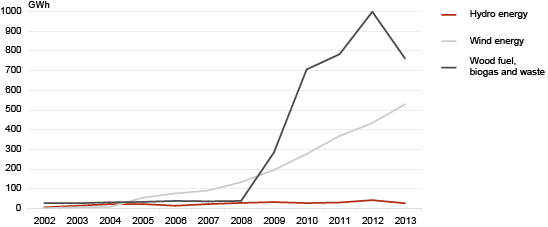Electricity production increased last year
The growth in electricity generation was caused by exports, which increased nearly 27% compared to 2012. Exports to Latvia accounted for over 90% of total exports and increased more than one-fourth compared to 2012. At the same time, due to an unusually warm winter period, the inland consumption of electricity decreased 1%.
While in 2009–2012 there was an increase in the share of electricity produced from biomass in the total production of renewable electricity, then in 2013 there was a sharp decrease in the consumption of wood fuel for electricity generation, which, in turn, caused a fall in renewable energy production. At the same time, the implementation of environmental projects has remarkably livened up waste treatment and increased the consumption of waste fuel and biogas for electricity generation. In 2013, wind energy production accounted for 40% of total renewable energy and increased nearly one-fourth compared to 2012 (22%).
In 2013, over 20 million tons of oil shale was produced, production increased 9% compared to the previous year. The majority of oil shale is consumed in power plants and as raw material for shale oil. In 2013, compared to 2012, consumption by power plants increased 16%, with 85% of electricity being produced from oil shale. Year by year, the consumption of oil shale in the oil industry has increased, together with the growth in shale oil production. The production of shale oil increased more than 4% compared to 2012. and more than 85% of the production was exported. 40% of the exported shale oil went to Belgium, followed by exports to the Netherlands (20%) and Sweden (18%).
In the last years, wood pellets have become an important type of fuel in the energy market. In the last five years, the production of pellets has increased more than 1.5 times. In 2013, the production of wood pellets grew nearly 15% compared to 2012. More than 90% of the wood pellets produced were exported: 61% to Denmark and one-fifth to Sweden.
While the production of peat fuels decreased significantly in 2012 due to bad weather conditions, then in 2013 the production increased substantially compared to the previous year. Compared to 2012, the production of peat for fuel grew nearly two-thirds and the production of peat briquette – 8%.
Electricity production from renewable sources, 2002–2013
